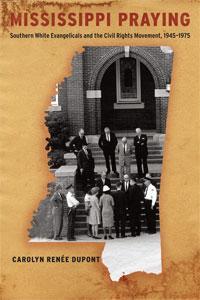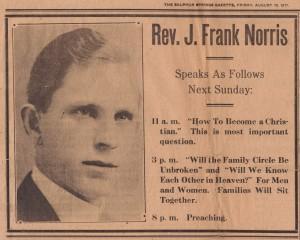 By Alan Bean
By Alan Bean
Carolyn DuPont’s Mississippi Praying: Southern White Evangelicals and the Civil Rights Movement, 1945-1975 can’t be purchased in any format for under $35, but it is a book I will definitely buy when my ship comes in. If her reviewers are anything to go by, DuPont covers much the same historical terrain I explored while doing my doctoral dissertation on southern white theologian W.O. Carver and, more recently, while researching the historical background of the Curtis Flowers case in Mississippi (for instance.)
Since I don’t have time to lay out my personal thesis, I will share Fred Clark’s excellent analysis of the issues before. Comparing DuPont’s treatment of civil rights era Mississippi with Mark Noll’s examination of the interplay between slavery and theological evolution in the South prior to the Civil War, Clark asserts that we are dealing with a second-verse-same-as-the-first phenomenon.
A crude biblical literalism was employed to justify slavery in the mid-19th century, and the identical hermeneutic was used to shore up segregation in the mid-20th century.
Now, Clark observes, the same theology is being employed to negate the equality of women.
Three strikes and you’re out.
I have one slight quibble. Although biblical literalism has been used to justify the unjustifiable, there is no logical link between a literal reading of Scripture and the embrace of regressive social policy. Anyone who is familiar with standard issue Black preaching knows that the Bible is interpreted in a literal, from-God’s-mouth-to-your-ears way, and yet African Americans frequently part ways with their conservative white coreligionists on issues like the Affordable Health Care Act and support for the public school system.
In other words, you can read the Bible literally without arriving at sub-Christian conclusions. It’s just that, if you want to embrace both Jesus and extreme prejudice, a literal reading of the Bible (combined with a virtuoso gift for explaining away the Amazing Grace of God that keeps popping up everywhere in Scripture) is a virtual necessity. It all depends on which verses you think should be taken at face value and which should be ignored or explained away.
Followers of Jesus, let it be clear, can hold a high view of biblical authority without denying the redemptive and reconciling arc of the biblical narrative.
Three strikes against white evangelical theology
September 16, 2013By Fred ClarkI’ve only read John Turner’s reviews and not the book itself, but Carolyn Dupont’s history, Mississippi Praying: Southern White Evangelicals and the Civil Rights Movement, 1945-1975, seems to revisit the same theological conflict Mark Noll traced in The Civil War as a Theological Crisis.
And, according to Turner, Dupont explicitly embraces the explosive conclusion that Noll sidesteps in his earlier history of an earlier time. Here is John Turner’s summary of this argument:
According to Dupont, white Mississippi evangelicals preserved the theology with which they had opposed the civil rights movement: biblical literalism and an intense focus on individual salvation to the (at least in theory) exclusion of social concerns. Dupont makes a strong case that opposition to civil rights was an important backdrop to the theological concerns that animated the conservative trend within the SBC and the creation of the PCA.
Indeed, her book is more than a chronicle of Deep South white evangelicals in the civil rights era. It is also an indictment of the individualistic theology of white evangelicalism. Readers should ponder this indictment. In Mississippi Praying, those Protestants with more complicated views of scripture and an openness to the social implications of the gospel are the moderates and progressives. At least some of them took (for Mississippi) bold stances on civil rights. Those with literalist views of scripture and an overwhelming focus on individual salvation backed segregation to the hilt.
This is identical to the theological division Mark Noll outlines in the decades leading up to the Civil War. In antebellum America, “Protestants with more complicated views of scripture” were overwhelmingly opposed to slavery. The theological defenders of slavery were, overwhelmingly, the definers and defenders of what they claimed was the more “biblical” and more theologically “conservative” approach of “biblical literalism and an intense focus on individual salvation.”
I want to dive deeper into this because it’s enormously important. Still, today, this morning, this is enormously important. For you, personally.
 This may seem like an intramural theological dispute between factions of white Protestants and, therefore, the very definition of a parochial matter. But here in America, white Protestant disputes over the Bible, what it means and how to read it, are never confined to pulpits and seminaries. These disputes tend to spill over into the broader culture, reshaping all of American politics. That was true, as Noll shows, in the 19th Century. That was true, as Dupont shows, during the civil rights movement. And it is true today, as our politics is now shaped by reaction against the advances of the civil rights movement and by a pervasive anti-feminism.
This may seem like an intramural theological dispute between factions of white Protestants and, therefore, the very definition of a parochial matter. But here in America, white Protestant disputes over the Bible, what it means and how to read it, are never confined to pulpits and seminaries. These disputes tend to spill over into the broader culture, reshaping all of American politics. That was true, as Noll shows, in the 19th Century. That was true, as Dupont shows, during the civil rights movement. And it is true today, as our politics is now shaped by reaction against the advances of the civil rights movement and by a pervasive anti-feminism.
Slavery was wrong. No one credibly disputes that today and it is now in no way “controversial” to say so emphatically. We are nearly all unanimously agreed that slavery was wrong, and the few fringe voices suggesting otherwise are rightly regarded as lacking any moral or intellectual credibility.
Slavery was wrong and the defense of slavery was wrong and the defenders of slavery were wrong. And the theology that was enlisted — that was invented — to defend slavery was wrong. It was a theological mistake that history has conclusively repudiated.
And yet that same theological mistake endured, a century after emancipation, and wasrepeated by “Southern White Evangelicals … 1946-1975.” The exact same white Protestant theology that had been designed and designated to defend slavery was again enlisted to defend segregation: “biblical literalism and an intense focus on individual salvation.”
Segregation was wrong. That conclusion is not quite as universal as the conclusion that slavery was wrong because that political battle has not yet been as conclusively decided. Five justices on the Supreme Court recently defanged the Voting Rights Act, sparking a wave of resurgent voter suppression efforts throughout the former Confederacy, and even — like Lee’s treasonous army — invading the Susquehanna Valley of Pennsylvania. But the verdict of history was still conclusive enough that those five justices had to frame this weakening of voting rights as a kind of affirmation of the immorality and unlawfulness of segregation. Yesbutofcourse, they said, the Voting Rights Act was necessary and proper and correct in its time. But we’ve moved on, they said, and because today we’re all agreed that segregation was wrong — morally, legally, intellectually wrong — we no longer need legal measures to prevent it.
Or look at the universal hagiography of Martin Luther King Jr. on the recent 50th anniversary of his speech at the 1963 March for Jobs and Freedom. King’s words and legacy are frequently twisted beyond recognition, and yet few, today, would be willingly to publicly disagree with the consensus view that King was right and segregation was wrong.
And if segregation was wrong, then the defense of segregation was wrong and the defenders of segregation were wrong. And the theology that was enlisted to defend segregation was wrong just as that same theology was wrong when it was used in the same way to defend slavery a century before.
“Biblical literalism and an intense focus on individual salvation” was a theological mistake that has been conclusively repudiated by history.
Twice.
Here we are, then, in 2013. American culture and American politics continue to be shaped by the lingering effects of slavery and of segregation, but our culture and politics are also being shaped by an ongoing dispute over women’s equality. The trajectory of this dispute is familiar and predictable and it seems clear that we will, eventually, arrive at the same kind of sweeping unanimity we’ve mostly achieved with regard to slavery and segregation. But we’re not there yet. The argument continues and advocates of patriarchy and male superiority are still confident enough that they’re willing — and able — to take a public stance without fear of the widespread condemnation that prevents anyone from taking a similar public stance today in defense of slavery or segregation. We are still in the middle of this dispute and not yet able to look back on it, stating a conclusive verdict.
Many of us, today, are saying that opposition to women’s equality is wrong, but to say so today is to take one side of a dispute that still has two sides to it in a way that the disputes over segregation and slavery no longer do.*
So let’s look at that other side of this dispute. It’s dominated by those making a familiar theological argument. The defense of patriarchy is, largely, a theologicaldefense based on the same theology that was used to defend slavery and to defend segregation. It is a theology based on “biblical literalism and an intense focus on individual salvation.”
It is a theological mistake, twice repudiated by history and in the process of being repudiated a third time.
This theological mistake of “biblical literalism” somehow still manages to frame itself as a “conservative” approach to the Bible and to theology. My contention is that there is nothing “conservative” about it. This was not the hermeneutics of the apostles, of the early church, of the Ante-Nicene fathers, of Augustine, or of the Reformers. It did not gain a foothold anywhere in the church until it arose among white Protestants in America as a defense of slavery.
This clumsy, proof-texting literalism is able to pose today as “conservative” because it has lingered here in America for centuries and theological mistakes — like politicians, ugly buildings, and prostitutes — “get respectable if they last long enough.” But just look at its record over the past 200 years of its ascendance among white American Protestants. It has been consistently, repeatedly, disastrously wrong.
We know this. We’ve seen this before and we’re seeing it again.
One, two, three strikes you’re out.
